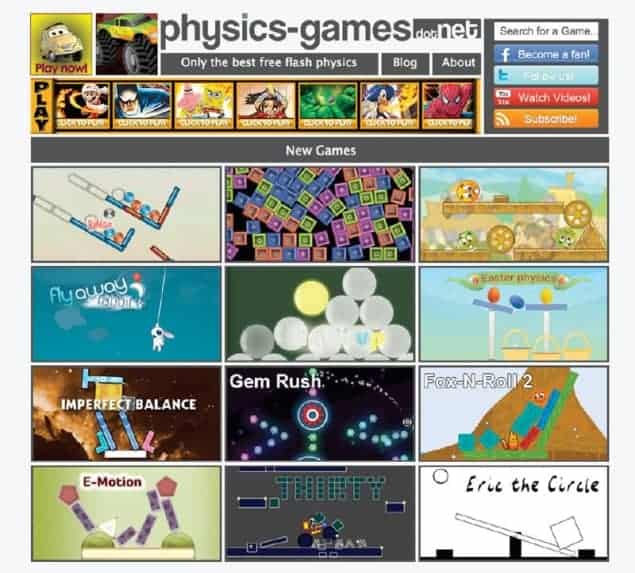Physics-GamesDotNet – the one-stop-shop for physics games

So what is this site about?
This is one of those sites where the name says it all. Physics-GamesDotNet is a one-stop shop for clever, innovative and sometimes silly games that feature physically realistic actions and effects. Common formats include bridge-building games, demolition games, brick-stacking games, catapult games and games that require players to move objects from one place to another using levers, inclined planes, rollers and other simple mechanisms. This may not sound like groundbreaking stuff – anyone for a game of Pong? – but closer inspection reveals some surprisingly sophisticated behaviour. Thanks to software that was once the preserve of scientific simulations, the towers in these games totter and tip before they fall over; rolling balls slow down on rough surfaces; and bridges give way under heavy weights. The result is a cross between a game and a basic physics lesson. It is not quite educational, but it is hardly mindless entertainment either.
Can you give me some examples?
Most readers will be familiar with the game Tetris, which requires players to manoeuvre differently shaped blocks into position. The Physics-GamesDotNet variant, 99 Bricks, uses the same set-up, but here the resulting stack is inherently unstable; players must build carefully to ensure that their tower stays upright. Another game, Water Werks, is like a liquid version of pinball: players use the pressure from a (virtual) jet of water to turn wheels and activate springs that guide balls towards an exit. And then there are some games that defy easy categorization. In Home Sheep Home, for example, players must solve physics-based puzzles to guide Shaun the Sheep and his woolly companions back to their barn.
Who created the site?
The site’s administrator is Jeremy Oduber, a student at the University of Amsterdam who has been interested in both science and games since he was a child. He finds physics games particularly appealing because “you can see physics happening all around you every day”. Moreover, he believes that games that incorporate realistic physics tend to be more open-ended than those that do not – meaning that there is usually no “best” way of beating a game or completing a level.
But how much physics is there, really?
It depends on how you look at it. To the casual gamer, the answer is probably “not much”. Although some bridge-building games do provide qualitative feedback on stresses and strains, anyone who wants numerical values for, say, a virtual object’s mass would be better off using a stand-alone physics simulator like Algodoo (see “Web life: Phun“). However, those who dig a little deeper into the world of physics simulation may be surprised at just how much complexity is involved in these relatively simple games. A typical physics simulator, or “engine”, incorporates both gravity and some kind of collision-response mechanism when solving the equations of motion for virtual cannonballs, blocks and so on, while more sophisticated engines also factor in rotations. Not too long ago, only supercomputers could perform such calculations rapidly enough to simulate realistic-looking physical behaviour. So a better answer to the question might be “quite a lot, actually – you just have to look for it”.
Who designs the games?
The games Oduber selects have been developed by people all over the world, from professional designers to teenagers working out of their bedrooms. To appear on the site, games must be bug-free and fun to play – and, of course, they must incorporate physics.
Who is it aimed at, and why should I visit?
Games like the ones on this site are, in Oduber’s view, “great at illustrating some basic concepts of physics in a fun way”. For younger children, we agree with him – particularly if, as is often the case, hands-on alternatives to cartoon wheels and levers are unavailable. But students with exams looming this month should not treat a few rounds of Crush the Castle as a substitute for reviewing their physics notes. Apart from anything else, the games on this site are amazingly addictive. We challenge readers to navigate the gravitational fields in Cosmic Crush or shoot their way through the levels in Ragdoll Cannon without feeling a little rush of excitement. Go on. Try it.



